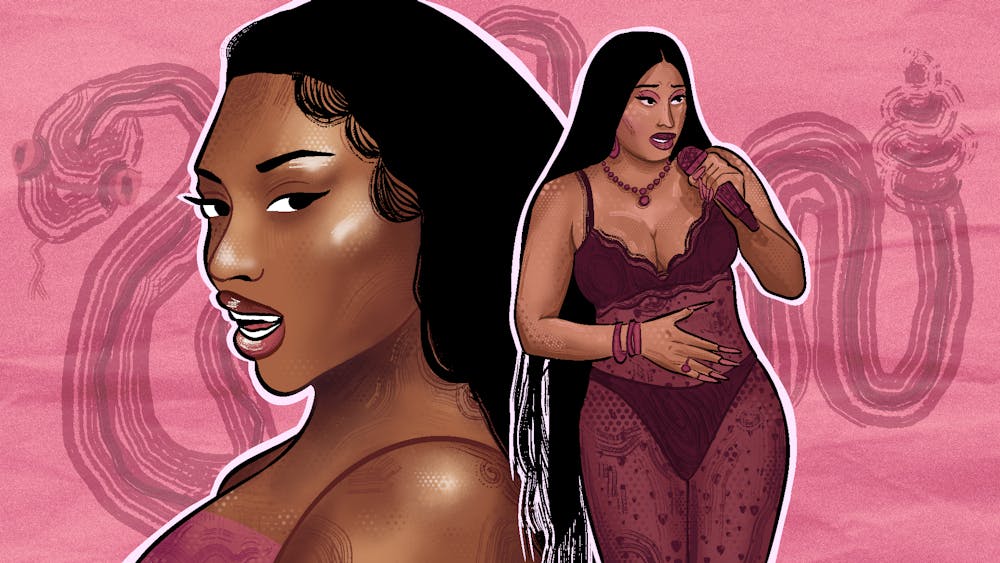Every girl remembers the verbal arguments between her and friends, peers, and foes. Some women credit these arguments with making them intimately aware of their shortcomings in everything from character flaws to how they style their hair. Psychologists even agree that arguments can be healthy; a researcher from the University of Georgia Jennifer A. Samp—concentrating on communications to study close relationships, conflict, power, and moral injury—argued that the “process of conflict and arguing facilitates talk and awareness of another’s perspective.” Despite everybody’s lifelong exposure to normal arguments between sisters, friends, and even colleagues, why are women deemed "mean" or "catty" when they argue? Additionally, in spite of a hip–hop culture of battle rap and rap beef, why do fans and onlookers hate it when the rap girlies fight?
Sexism is as pervasive in rap as in mainstream media. There are many more women in mainstream rap currently than there have ever been in history. Misogyny holds true regardless of an uptick in representation. Women’s rap disputes are just them partaking in the culture of rap, but their fights receive unfavorable media coverage. A recent headline in The Guardian reads, "Nicki Minaj conquered attacks to become queen of rap. Now she’s turned her fire on Megan the Stallion." The New York Times also writes, "Megan Thee Stallion and Nicki Minaj: Who’s mad at Whom?" And there's an overwhelmingly present objectification of women in rap music, with over 67 percent of songs in the genre containing themes of sexual objectification. Sarah Sherard, in her article, "From Battles to Bigotry: The Barriers of Sexism in Hip–Hop," writes that "[Girl rap beef] boils down to misogyny in rap culture." This is a stark contrast to male rap beef, which centers on lyricism or feuds focused on the exclusion of women. In a male dominated arena, there exists a tokenism of a few female rappers that often leads to drama. So it’s no surprise that the Megan's success is seen as rivaling Nicki Minaj’s seniority.
In anticipation of Nicki Minaj’s album Pink Friday 2, fans of Minaj deciphered lyrics aimed at Megan Thee Stallion. Minaj boasts in her single "Red Ruby Da Sleeze": “700 on the horses, when we fixin’ to leave / But I don’t fuck with horses, since Christopher Reeves.” Fans understood the lyrics as a slight to Megan Thee Stallion. "Stallion" refers to a horse, and Megan was born the same year as Reeves's tragic accident with a horse, which left him paralyzed. In response, Megan dropped "Hiss." Megan raps, “Aye, these hoes don’t be mad at Megan / These hoes be mad at Megan’s Law,” alluding to Nicki Minaj’s husband, who was previously sentenced to three years probation for failing to register as a sex offender in Los Angeles. Minaj then announced the release of an official diss track, "Big Foot." Minaj responded directly to the Megan Law line: “This lil' beggin' whore talkin' ‘bout Megan Law / For a free beat, you can hit Megan raw.” Minaj’s hook references Megan’s tragic shooting by rapper Tory Lanez. Megan has yet to address the drop of "Big Foot" or the discontent for Minaj personally outside of her single, "Hiss."
It’s no secret that competitors fight. Megan Thee Stallion and Nicki Minaj are two of the most prominent rappers in the industry, both having hit the Billboard Top 100 multiple times. Minaj's 23 Top Ten Singles mark the highest of any female rapper. It is safe to say they are both successful artists in the industry, with solidified spots in rap history and beyond. With this being said, the arena in which their musical medium exists, hip–hop, is no stranger to a foe. Battle rap is historicized and essential to the history and fabric of hip–hop.
There is also no debate that rap has historically been a male–dominated production. According to Msia Clark, a professor of African culture and feminist studies at Howard University, women were “largely invisible” in hip–hop during the 80s and early 90s. Clark further explains that “female rappers had the challenge of navigating a culture tinged with sexist and sexual harassment [to] … carve out a perspective [unheard of]... in the mainstream.” Before their recent falling out, Nicki and Megan collaborated back in 2019 on a women's empowerment anthem, "Hot Girl Summer," reaching number 11 on the Billboard Hot 100 Chart. The lyrics were fun, sexy, and innovative, showcasing their talents as feminist icons. Nicki and Megan both sported matching red hair as Nicki spits, “And who gon’ tell him that my bitch is getting her degree?" making the song relatable for college–age women. Most rap beef is short–lived, like the most epics ones between Drake and Meek Mill or Jay–Z and Nas. Even the feud between Nicki’s YMCMB labelmates Lil Wayne and Birdman has faded out. So, if feuding is a natural part of hip–hop culture and commonplace, why does women’s rap feud seem so unfavorable in media takes?
It is simple: misogyny. In a world that tells women it’s not femme to express anger or even defend themselves or their loved ones, it is no surprise two powerful women are under fire for their feud. To mainstream society, it is simply not ladylike. But, as the great Queen of Rap once said, “Kiss [their] ass and [their] anus.” The world just must get used to normalizing girl beef.







